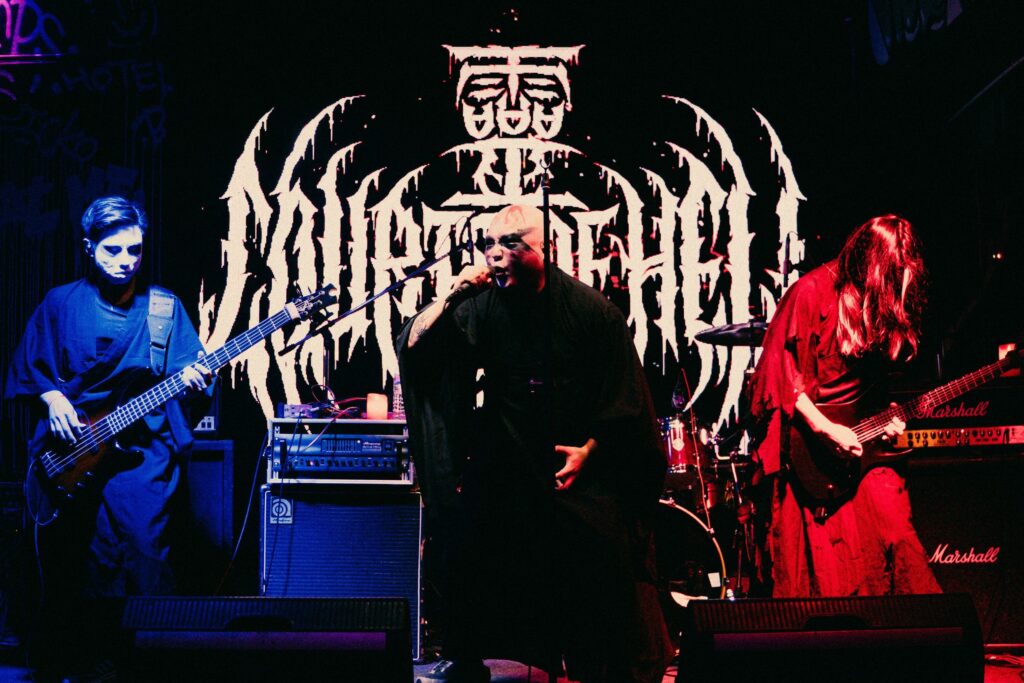
After 2 years of relentless passion and creativity, Singaporean metal band COURTS OF HELL have released their new EP, “Impermanence 黑白无常”.
Impermanence 黑白无常 wants to take listeners on a profound journey through the realms of darkness, existential reflection, and the cyclical nature of life and death. Each of the six tracks delves into complex themes that intertwine human experiences with supernatural elements. Together, these tracks create a haunting yet introspective experience, inviting listeners to contemplate the deeper meanings of existence and the eternal dance between life, death, and the shadows that accompany us.
Shadows of Eternity
The song “Shadows of Eternity” explores themes of darkness, conflict, and the search for peace in a tumultuous existence. It evokes imagery of a deep abyss, where the interplay of black and white symbolizes the struggle between good and evil. The “eternal shadows” suggest a sense of inevitability and a destination for souls entwined in an eternal battle.
Throughout the lyrics, there’s a focus on the pain and suffering that resonate within, with echoes of ancient hatred creating a profound inner emptiness. The imagery of dancing flames and haunting screams illustrates the torment experienced in this dark realm, yet it is also in this darkness that the characters find solace and determination to move forward.
The song conveys that despite the relentless conflict—depicted as a war between black and white—there is a yearning for resolution amidst the chaos. Ultimately, it reflects on the duality of existence and the quest for understanding and freedom within the “shadows” that define our journey.
The Seven Month
“The Seventh Month” delves into the haunting theme of restless spirits returning to exact vengeance on the living. The lyrics depict a chilling atmosphere where unseen forces and “hungry ghosts” emerge from the darkness, filled with ancient rage. These tormented souls symbolize unresolved issues and unpaid debts, embodying a curse that never dissipates.
The song captures the chaos and despair that ensue in their presence, illustrating how the ghosts unleash terror and madness upon the living. Despite attempts at rituals and prayers, there is no sanctuary from their relentless pursuit of revenge, shaking the foundations of sanity and hope.
This eternal cycle of suffering reflects the consequences of broken promises and neglect, emphasizing the idea that these spirits return year after year, trapped in a pattern of vengeance and fate. Ultimately, the song portrays the relentless grip of the past, reminding listeners of the inevitable consequences of unresolved grievances and the perpetual cycle of torment that binds them.
红白双煞 The (Un)Holy Matrimony
The lyrics tell the tragic and haunting tale of a love that transcends life and death, where passion and vengeance intertwine.
The story begins with a bride whose life is consumed by flames, her tears turning to ash as she is reborn as the Red Spirit, driven by an unrelenting thirst for revenge. Fueled by a deep, eternal grudge, she takes a hundred lives to avenge her own, seeking a soul whose fate is tied to hers.
Her journey is met by the White Spirit, the groom, who is drowned in grief and transformed by vengeance after his bride’s death. Now, a relentless force of destruction, he embarks on his own path of retribution, searching for his lost love in a world of suffering and conflict. Despite the wrath of gods and barriers of fate, the two spirits’ destinies are entwined, both seeking the same end: to be reunited, even through death.
The Red and White Spirits represent two halves of a tragic, undying love, brought together by both fire and water, life and death. As they fight through their trials, their spirits merge in a battle of passion and destruction, unable to be separated. The bridge of the song emphasizes the fusion of flame and ice, suggesting an eternal bond that defies the natural world, while the outro reflects the unbreakable connection between them, even at the end of time.
Ultimately, the story explores themes of love, vengeance, and the blurred boundaries between life and death. It illustrates how love, even when marred by grief and revenge, endures across the boundaries of existence, forever uniting two souls destined to be together, no matter the cost.
Transmogrification
“Transmogrification” explores the concepts of transformation and the cyclical nature of existence. The lyrics describe a journey through ethereal realms, emphasizing that this experience is not death but a process of becoming. The imagery of light, fire, and whispers suggests a profound state of change, where the self dissolves into nothingness.
As the song progresses, it reflects on the themes of collapse and fragmentation, portraying a struggle with identity and existence. The idea of eternal dissolution and reassembly conveys that life is a continuous cycle, where nothing truly dies but instead transforms and migrates into new forms. Ultimately, the song
embraces the notion that separation leads to metamorphosis, highlighting the beauty and inevitability of change.
Empty-Handed
“Empty-Handed” reflects on the transient nature of life and the inevitability of death. The lyrics convey that we enter the world with nothing and will leave it the same way, emphasizing the futility of material pursuits and societal status. The imagery of being “hands bare and clean” underscores the idea that all human beings, regardless of wealth or power, ultimately share a common fate.
The repetition of the cycle of life, where we rise from dust and return to dust, illustrates the ephemeral quality of existence. The song critiques the relentless chase for illusions and superficial achievements, highlighting how they crumble when faced with mortality. Ultimately, it conveys a message of equality in death, where no distinctions or worldly possessions matter. In the end, we are all bound by the same fate, returning to darkness with nothing to hold.
地藏王 Kṣitigarbha
The song “地藏王 Kṣitigarbha” tells the story of the monk Kṣitigarbha, who embodies the themes of judgment, sin, and the struggle against the cycle of rebirth and punishment. The lyrics depict a vivid imagery of flames consuming the sinful, representing the divine retribution for transgressions. Kṣitigarbha is portrayed as a compassionate figure navigating through the endless cycle of suffering, urging individuals to confront their sins and accept their fate. The song emphasizes a call for repentance and accountability, while highlighting the inescapable consequences of one’s actions. Through Kṣitigarbha’s presence, it conveys a message of moral responsibility and the profound impact of embracing one’s truth in the face of retribution.
Featured

Technical Brutal Death Metal CELESTIAL GORGE Release New Single [India]
Unite Asia | January 28, 2026After a significant hiatus, CELESTIAL GORGE is back with their first single from the upcoming album, releasing late 2026. Redemption is a cry for clarity amongst the noise of...
-
 Unite Asia | January 28, 2026
Unite Asia | January 28, 2026
-
Reviews
-
 Unite Asia | November 11, 2022
Unite Asia | November 11, 2022
REVIEW: Hong Kong Post-Hardcore Act Wellsaid Release Sophomore Album ‘Lurking’
-
 Unite Asia | April 3, 2022
Unite Asia | April 3, 2022
REVIEW: Hardcore Punk Act SPIT Release Self-Titled Debut Album [Taiwan]
-
 Unite Asia | August 31, 2021
Unite Asia | August 31, 2021
REVIEW: Melodic Death Metal Band Reborn Release EP [Vietnam]
-
 Unite Asia | August 4, 2021
Unite Asia | August 4, 2021
REVIEW: The Most Important Punk Rock Release of 2021 – The Rebel Riot [Myanmar]
-
 Unite Asia | June 15, 2021
Unite Asia | June 15, 2021
REVIEW: Metalcore Band Prompts’ ‘Magenta Smile’ Gets A Full Review [Japan]
-
Upcoming Releases
-
 Unite Asia | February 21, 2026
Unite Asia | February 21, 2026
This Is Fucking Amazing – Death Metal Act KINH Release Debut Album [Vietnam]
-
 Unite Asia | February 19, 2026
Unite Asia | February 19, 2026
Philippines Meets RBS Madness – Beatdown Band BLOODSTAIN Drop Debut EP [Philippines]
-
 Unite Asia | February 19, 2026
Unite Asia | February 19, 2026
Thailand Drop Banger New Split EP TEN BAHT PER HOUR / FOD [Hardcore / Thrash Metal]
-
 Unite Asia | February 12, 2026
Unite Asia | February 12, 2026
-
 Unite Asia | January 30, 2026
Unite Asia | January 30, 2026
-
Facebook
Recent Posts
-
 Unite Asia | February 28, 2026
Unite Asia | February 28, 2026
YOOOOOO!!! If You Listen To Anything Today – Check THIS Out! Grindcore Duo CRAPGUM!
-
 Unite Asia | February 28, 2026
Unite Asia | February 28, 2026
Berlin-based Hardcore Band ZANJEER Return With First Taste of New Full Length [Germany]
-
 Unite Asia | February 28, 2026
Unite Asia | February 28, 2026
Filipino Metal and Hip Hop Team Up On Raging New Single ‘Magna’ [INTOLERANT/MOROBEATS]
-
 Unite Asia | February 25, 2026
Unite Asia | February 25, 2026
American Band YEAR OF THE DEAD (Hong Kong Fuck You) Announce Japan Dates
-
 Unite Asia | February 25, 2026
Unite Asia | February 25, 2026
Hardcore Metal Band ARCADIA Drop Emotional MV for ‘Fading Pages’ [Philippines]
-
Sitemap
Latest Posts
-
 Unite Asia | February 28, 2026
Unite Asia | February 28, 2026
YOOOOOO!!! If You Listen To Anything Today – Check THIS Out! Grindcore Duo CRAPGUM!
-
 Unite Asia | February 28, 2026
Unite Asia | February 28, 2026
Berlin-based Hardcore Band ZANJEER Return With First Taste of New Full Length [Germany]
-
 Unite Asia | February 28, 2026
Unite Asia | February 28, 2026
Filipino Metal and Hip Hop Team Up On Raging New Single ‘Magna’ [INTOLERANT/MOROBEATS]
-
 Unite Asia | February 25, 2026
Unite Asia | February 25, 2026
American Band YEAR OF THE DEAD (Hong Kong Fuck You) Announce Japan Dates
-
Categories
Featured hardcore Indonesia Japan Philippines metal female Malaysia hardcore punk Singapore metalcore Hong Kong punk rock Thailand pop punk punk China India death metal indie rock Korea grindcore emo Post hardcore black metal Taiwan Nepal melodic hardcore thrash metal metallic hardcore Vietnam post rock hardcore metal alt rock screamo beatdown deathcore post punk emotive punk shoegaze
Copyright © 2024 Unite Asia. Designed and powered by ALT-X Agency.




